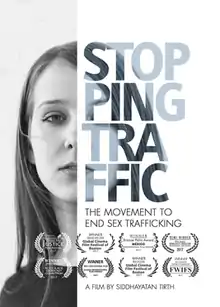Stopping Traffic
Stopping Traffic is a 2017 American documentary film directed by Sadhvi Siddhali Shree and produced by the team of monks at Siddhayatan Tirth.[2][3][4]
| Stopping Traffic | |
|---|---|
 Official Movie Poster | |
| Directed by | Sadhvi Siddhali Shree, Sadhvi Anubhuti[1] |
| Produced by | Siddhayatan Tirth |
| Edited by | Jason Calhoun |
Production company | Siddhayatan Tirth |
Release date | September 29, 2017 |
Running time | 79 minutes |
| Country | The United States, Philippines, Mexico |
| Language | English |
The film explores the extensive reach of sex trafficking and sexual abuse especially of children in the United States and worldwide. Using commentary by victims and activists and investigations into practices in the US and abroad, the film traces the links between child sexual exploitation, pornography, social media, and sex trafficking. It calls on the viewer to join the movement to end sex trafficking.
Stopping Traffic made its world premiere at the Global Cinema Film Festival of Boston, a human rights festival, on March 11, 2017 where it won Best Picture prize.[5]
Synopsis
Stopping Traffic investigates the international crisis of human sex trafficking, particularly of minors, in a deeply personal point of view. It features interviews with child sexual abuse and sex trafficking survivors and veteran activists, and additional commentary from social service agents, doctors, academics, and young activists.
Citing a 2014 report by the International Labour Organisation, the documentary tells that 27 million people are being trafficked worldwide every year, delivering $150 billion a year to their captors.[6][7]The story explores cases throughout the Philippines, Mexico, Thailand, Iraq, and major U.S. cities to provide raw images and first-hand documentation of human trafficking crime across the globe.[8][9] It explores the practices within families and in the streets, explaining how a child or young adult are turned into being trafficked, at an average cost to a trafficker of $90, but with a potential to yield thousands. The creators establish the U.S. as the biggest source of sex traffickers' customers with the Super Bowl being the most popular event for scoring a trafficking arrangement.[10]
The documentary also suggests nine specific ways in which the public can participate to help stop the trafficking, including writing to authorities, reporting alleged trafficking, and talking to friends about the subject.[11]
Production
The film is the first by Sadhvi Siddhali Shree, a 33-year-old Jain monk, U.S. Army Iraq War veteran and child abuse survivor, an international activist and author of 31 Days to a Changed You, Shine Through Wisdom.[12][13] It was inspired and is based on the teaching of non-violence by Acharya Shree Yogeesh, who is the executive producer of the film. Jeannie Mai, co-host of the Emmy Nominated "The Real" daytime TV show, is also an executive producer of the film.[14][11]
The documentary also features talking points by celebrities such as an actor Dolph Lundgren and other celebrities who raise awareness about human trafficking.[15] The film is a volunteer endeavor funded by a Kickstarter campaign.[16][13][17]
Release
The film was screened as an 'Official Selection' at the 2017 Global Cinema Film Festival of Boston, Show Me Justice Festival, Fort Worth Indie Film Showcase, and Long Beach India International Film Festival 2017.[18]
Reception
Stopping Traffic won Grand Jury Prize and Best Picture at the 2017 Global Cinema Film Festival of Boston, Bronze Palm Award at Mexico International Film Festival 2017, Best Domestic Feature Documentary at Fort Worth Indie Film Showcase (FWIFS), Best Educational Film at Alaska International Film Awards, REMI 50 annual Worldfest-Houston International Film Festival 2017 and Winner Award of Merit at the Accolade Global Film Competition.
In January 2018 NowThis News selected the film during the National Human Trafficking Awareness Month, featuring the video of the two Jain monks and excerpts from the documentary. The video went viral on Facebook and has gained nearly 1 million views. [19]
References
- "'Stop Trafficking' Is A Documentary About Human Trafficking". NowThis News. Retrieved 20 February 2020.
- "Saskatchewan woman returns from documenting Philippines sex trade". CBC News. Retrieved 2017-06-07.
- "Film spotlights human trafficking as Trump promises action". Boston Herald. Retrieved 2017-06-07.
- Mitch Mitchell (16 July 2017). "A film that aims to stop child sex trafficking makes its Fort Worth debut Sunday". Star Telegram. Retrieved 19 July 2017.
- "A film that aims to stop child sex trafficking makes its Fort Worth debut Sunday". Star-Telegram. Retrieved 2 August 2017.
- "Forced labour, modern slavery and human trafficking". International Labour Organization. Retrieved 2 August 2017.
- "'Stopping Traffic' takes aim at the abuse and prostitution of children". Washington Post. Retrieved 20 February 2020.
- Meyer, Logan. "Humanitarian documentary seeks trafficking's end". The Huntington News. Retrieved 2 August 2017.
- "Film Spotlights Human Trafficking as Trump Promises Action". US News. Retrieved 2 August 2017.
- "Super Bowl known as 'largest human trafficking event'". KSAT. Retrieved 2 August 2017.
- "New Documentary 'Stopping Traffic' Wants to Help Stop Modern-Day 'Slavery'". NBC News. Retrieved 20 February 2020.
- "Team". Stopping Traffic. Retrieved 20 February 2020.
- "Film spotlights human trafficking as Trump promises action". AP News. Retrieved 2017-06-07.
- "Jeannie Mai is 'Stopping Traffic' with new documentary against modern day slavery". Resonate. Retrieved 20 February 2020.
- "Film spotlights human trafficking as Trump promises action". Fox News.
- "Team". Stopping Traffic. Retrieved 20 February 2020.
- "STOPPING TRAFFIC—The Movement to End Sex Trafficking". Kickstarter. Retrieved 2 August 2017.
- Editor, J. "MILES" VENTIMIGLIA. "Show-Me Justice". Daily Star-Journal. Retrieved 2017-06-07.CS1 maint: extra text: authors list (link)
- "Two U.S.-based Jain Monks' Documentary on Human Trafficking Goes Viral". India West. Retrieved 20 February 2020.